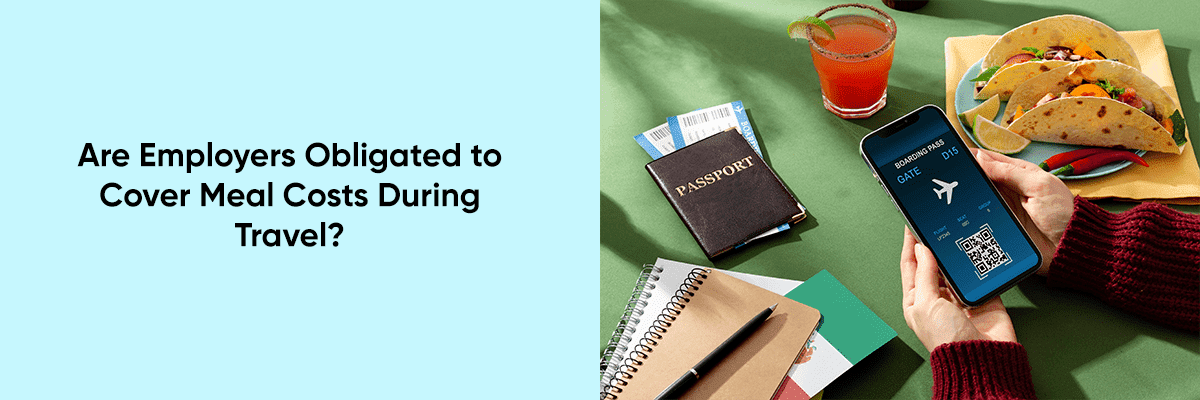Sometimes we have to travel for company purposes. Where and when we have to go all depends on the work and company where we are working. For some employees their job role involves traveling for business purposes, specifically to various locations where they perform their job functions.
Business travel often involves attending meetings, seminars, and meeting partners. During these trips, employees may incur expenses such as airfare, taxi fares, hotel accommodations, and meals.
Companies typically provide travel pay to cover employees’ travel-related expenses. This can either be in the form of reimbursement for expenses paid out of pocket or a per diem—a fixed daily allowance meant to cover all travel costs.



This blog focuses on meal costs during business travel, a small aspect of payroll and accounting. To learn more about payroll and accounting, visit our webinar page. There, you’ll find various webinars conducted by industry experts that offer valuable training and insights into payroll and accounting, helping you stay up to date and compliant.
Let’s delve into the main topic and explore the answer together.
Are Companies or Employers Required to Provide Meal Expenses for Their Employees When They Travel?
Employers are not always required to cover meal costs for employees during travel. So the answer to the above mentioned question is both ‘yes’ and ‘no,’ as it depends on various factors. So, what are these considerations or reasons?
Where did the employee choose to eat?
Even if a company reimburses travel expenses, it doesn’t mean every expenditure will be covered. For example, if an employee chooses to dine at an expensive restaurant far from their hotel, rather than eating reasonably priced food at the hotel where they are staying or at a nearby local restaurant, the company might reject the reimbursement request for the extravagant meal. Companies typically reimburse only reasonable and necessary expenses.
Food is Necessary or Not
What you eat and how frequently you eat can affect whether your expenses are reimbursed. For instance, during a business trip where you need to visit multiple sites for product inspections, small purchases like coffee or a donut to keep your energy up are likely to be reimbursed.
(Expensive Chocolate Pastry)
These are considered necessary for maintaining focus and productivity. However, personal indulgences, such as chocolate pastries or fancy chocolates, are generally viewed as non-essential treats. If you only indulge once or twice during a week-long trip, you might still be reimbursed. However, if you frequently purchase such items, the company might view all such treats as non-essential and deny reimbursement for these expenses.
Company Policy
Company expense reimbursement policies clearly outline which expenses are eligible for reimbursement, including specific details about food expenses during travel. These policies typically specify what types of meals are covered for breakfast, lunch, and dinner, the daily spending limits, and acceptable dining locations. To ensure you receive reimbursement, carefully review the company’s policy to understand what is included. If certain food expenses are not covered, it’s best to avoid those costs, as they will not be reimbursed.
Labor Laws
In some states, companies are required by law to cover meal expenses incurred by employees during business travel. These regulations may also set limits on the maximum amount that can be reimbursed for food costs. Therefore, employers must comply with the specific laws and regulations of the regions where their business operates regarding meal reimbursements for employees on business trips.
Do You Have Proper Receipts?
Not having the proper expense receipts is the most common mistake in expense reimbursement. Receipts are crucial for reimbursement of food-related expenses too. Even if a company reimburses employees for meal costs, they require receipts as proof of the expenses incurred.
(Expense receipt)
Without proper documentation, the company may deny reimbursement, as there is no evidence of the expenses being valid. Therefore, it is essential to keep and submit all receipts for food purchases made during your trip to ensure you receive the reimbursement you are entitled to.
Have You Consulted Your Supervisor?
Company policies often set daily limits on travel expenses, which include specific allocations for food, accommodation, and transportation. For instance, if the daily limit is $140, you might be allocated $70 for food, $56 for accommodation, and $14 for transportation.
If you have already spent the full $70 allocated for food and still wish to purchase an additional meal, such as a $20 pizza, you must first seek approval from your supervisor. If your supervisor grants approval, you will be reimbursed for the extra expense. However, if you make the purchase without prior approval, you might not be reimbursed, as the company is only obligated to cover expenses that are within the pre-approved limits. Always obtain prior approval for any expenses that exceed the daily limit to ensure they will be reimbursed.
Conclusion
In summary, whether employers are obligated to cover meal costs during travel depends on several factors, including company policies, the nature of the expenses, and applicable labor laws. Companies typically reimburse only reasonable and necessary expenses and may provide a per diem—a fixed daily allowance for all travel costs, including meals. Policies often outline specific limits and conditions for such allowances. Employees should review their company’s reimbursement policy or per diem payments guidelines, keep all receipts, and seek prior approval for any expenses that exceed the daily limits to ensure reimbursement. Adhering to these guidelines helps manage travel expenses effectively and ensures reimbursement eligibility. For further insights into payroll and accounting, explore our webinars conducted by industry experts.


